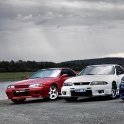Factory Ecu Re-mapping Discussion
Announcements
-
Similar Content
-
Latest Posts
-
Bugger "making it look stock". I put one conventional internally fused Hella relay behind each globe. I just pulled the plugs off the back of the globes and built new loom segments with male and female plug parts to match up to the original loom and the globe, and used the original power wires to each globe coming from the switch through the original loom plug to trigger the relays. Ran a big fat (also separately fused) power wire across the front of the car to feed all the relays. It's as ugly as f**k, but it is wedged down between the headlight and battery on the RHS and the airbox and headlight on the LHS, and no-one ever looks in my engine bay, and on the odd occasion that they do I simply give no f**ks for what they think. Fully reversible - not that you'd ever want to. For f**k's sake. It's a Skyline. They made million of the bloody things. We've been crashing them into roadside furniture for 30 years now. There is a negative side effect to putting relays on the headlights. The coil current is too little to properly clean the contacts in the switches and they get blacked up and you have to open them up every couple of years and clean them manually. I have 25 years of experience on this point.
-
By joshuaho96 · Posted
I was poking through the R34 wiring diagrams vs R33 and noticed that the R34 has proper headlight relays while the R33 is like the R32 and sends full headlight power through the headlight switch. I'm not afraid of wiring but I really would like to do this in a way that looks OEM (clipping into open positions on the OEM relay box) and also unlike the factory wiring which interlocks the high beam and low beam on the halogen series 1 GTR headlights I want to make it such that turning on the high beams keeps the low beams on as well. Any advice on how to locate the specific connectors + crimp terminals + relays I need? I was thinking one NO relay for low beams and another for combined high + low running off the factory high beam headlight connector. I don't really want to splice into a crusty old probably discontinued factory harness so fully reversible is my goal here. -
Pretty sure they run the same engine as the Q50 hybrid which specifies 95 RON. I ran 98 in mine for a while, but it made no difference in performance or economy, so I have been using 95 for the last few years. I have never hit 6.0L/100km, but have returned mid to high 6 on the highway. Being a hybrid, fuel economy is a lot more dependant on how you drive it. At 110km/h, mine never goes into EV mode on the highway, so returns closer to 7.5L/100. urban driving can return low 8s if you are careful or over 10 if you are a bit more enthusiastic on the throttle.
-
About a quarter of what you want to do. It's only R7R, not R&dismantle&replaceparts&reassemble&R. ? It is stock. I already told you, you will NOT have broken those. It's f**king 4th gear for Christ's sake. You just chipped the teeth off.




Recommended Posts